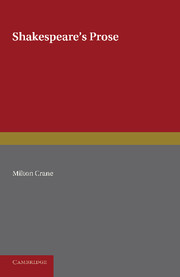II - English Dramatic Prose before Shakespeare
Published online by Cambridge University Press: 05 June 2016
Summary
Prose was well established in the Elizabethan drama long before Shakespeare came to London. In order to understand the background against which Shakespeare worked during his entire career, it will be necessary to examine in some detail the use of prose made by his most significant predecessors and fellow-playwrights. An appreciation of their reasons for introducing dramatic prose into their plays will permit a fairer assessment of Shakespeare's indebtedness to accepted convention and of his innovations. The earliest appearances of prose in the drama, in George Gascoigne's translation of Ariosto's I Suppositi and in Henry Medwall's Nature, are not strictly germane to this study. Gascoigne may have chosen prose for his translation because he deemed it more appropriate to the matter of the play or to his artistic purpose than verse; but, in the absence of such information, his prose version can play no part in the history of dramatic prose in English.
Among Shakespeare's predecessors, Lyly, Marlowe, and Kyd were most imaginative in their use of prose, and their plays will be treated here in some detail as representative of the pre-Shakespearean drama. Other playwrights will be considered more briefly.
Lyly
R. Warwick Bond, in his edition of Lyly's works, sums up in the following words Lyly's contribution to English dramatic prose: resolved to throw the whole of his matter into prose, prose which he made now serious and dignified, now bright and witty, but such as always gave the sense of selective skill and controlling power. He asserted his freedom from mechanical slavery, but only that he might better obey the higher laws of dramatic and literary effect. He was not the first dramatist to use prose; but he was the first to demonstrate, by persistent and successful use of it, its claim to be the received vehicle for English comedy.
This statement of Lyly's achievement is unexceptionable, but surely Mr. Bond's explanation of Lyly's decision to adopt prose is incomplete. A study of the plays reveals the dramatist's steadily developing maturity of technique, but can hardly make one feel that when Lyly forsook the novel for the drama he was already a seasoned master of his new art.
- Type
- Chapter
- Information
- Shakespeare's Prose , pp. 9 - 31Publisher: Cambridge University PressPrint publication year: 2013

